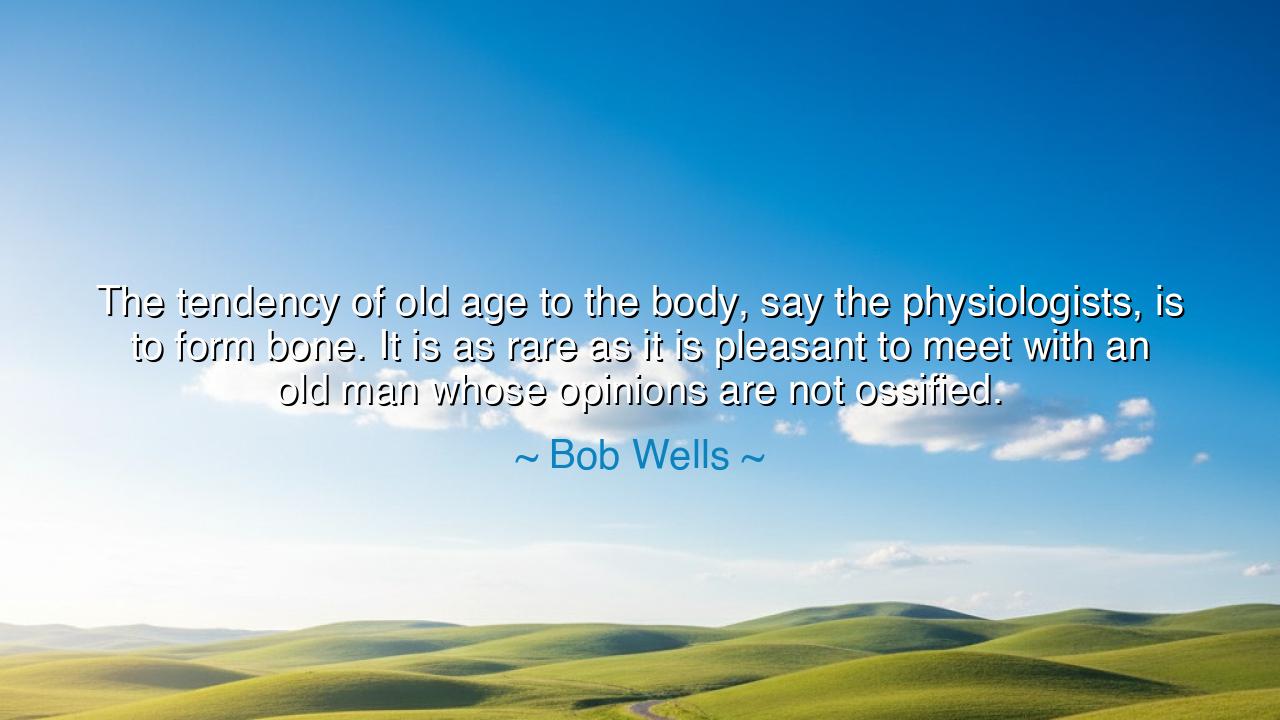
The tendency of old age to the body, say the physiologists, is to
The tendency of old age to the body, say the physiologists, is to form bone. It is as rare as it is pleasant to meet with an old man whose opinions are not ossified.






"The tendency of old age to the body, say the physiologists, is to form bone. It is as rare as it is pleasant to meet with an old man whose opinions are not ossified." These words of Bob Wells carry a profound and piercing reflection on the human condition. It is true that as our bodies age, they become more rigid, more structured, as the soft tissue of youth gradually hardens into bone. In the same way, our opinions and ideas, when left unchecked, too become hardened with time. Ossified—a word that conjures up images of fossilized, immovable structures—becomes the perfect metaphor for how many grow set in their ways, their beliefs cemented by the passage of years. Wells' words suggest that old age, like bone, often brings a stiffness not just to the body but to the mind itself, making flexibility and open-mindedness rare and precious traits in the elderly.
From the very first breath, the human body is in a state of perpetual change. We grow, we expand, and eventually, we start to ossify. But it is not just the body that undergoes this process. The mind, too, has the tendency to grow rigid as the years pass. The metaphor Wells uses is sharp and powerful—just as bone gives the body structure, the ossification of opinions gives the individual a sense of stability. But what begins as necessary structure can often become an obstacle to growth. For just as bones can break when they are too rigid, so can our beliefs fracture when they no longer bend with the winds of change.
In the annals of history, we find examples of those who have embraced the wisdom of open-mindedness, despite the natural pull toward ossification. Take the case of Socrates, the great philosopher of ancient Greece, who, even in his later years, was willing to question his beliefs and entertain new ideas. Despite his age, he was not trapped by the rigidity of fixed opinions. Instead, he embraced the idea that true wisdom lies in acknowledging how much one does not know. It is this humble spirit that allowed him to remain ever open to learning, a stark contrast to the ossified minds that often surround us as we age. Socrates’ life teaches us that even in old age, we must strive to keep our minds flexible—to stay open, to keep learning, and to continue growing.
Yet, such openness is rare. Old age, in its most common form, brings a weariness to the mind, much as it does to the body. We see it in the lives of many who, as they grow older, become more steadfast in their opinions, their worldviews no longer challenged by the vigor of youth or the curiosity of discovery. The dangers of this, however, are evident. A mind that has ossified becomes a prison of the past, locked in the beliefs and ideas of an earlier time, unable to stretch or grow with the unfolding of life. And in this rigidity, there is a profound loss—not just of the youthful spirit, but of the very vitality that makes us human.
Take, for example, Nelson Mandela, who, even in his later years, remained deeply committed to learning and adapting. His journey, one marked by immense suffering and confinement, did not close his mind to new ideas, nor did it lock him into rigid ideologies. Instead, Mandela’s openness to dialogue and reconciliation—especially after his release from prison—became one of the defining characteristics of his legacy. His wisdom came not just from his experience but from his ability to look forward, to allow his opinions to evolve with the changing tides of society. Mandela’s life serves as a testament to the fact that while old age may form bone in the body, it need not harden the mind. We must follow his example and resist the temptation to close ourselves off.
In these examples, we find the great lesson that Bob Wells offers us: old age need not bring the ossification of the soul. We can be as flexible in our thoughts as we are in our hearts, constantly revising and reshaping our opinions, just as we once did in our youth. To live without this flexibility is to become a statue, fixed and unchangeable, devoid of the true vitality that life offers. The true strength of old age lies not in how much we know but in how much we are willing to learn, to adapt, and to embrace new perspectives, no matter how many years have passed.
Thus, as we journey through life, we must strive to avoid the temptation of becoming ossified. The practical lesson here is clear: seek to remain open-minded, even in the face of time’s ravages. Seek out the wisdom of others, question your assumptions, and allow your ideas to evolve. This is the only way to prevent becoming trapped by the rigidity of old age and to remain vibrant, ever-growing, and ever-evolving—until the very end. Let us remember that wisdom does not come from holding onto old truths, but from the willingness to let go of what no longer serves us and embrace the endless possibilities of the future.






AAdministratorAdministrator
Welcome, honored guests. Please leave a comment, we will respond soon